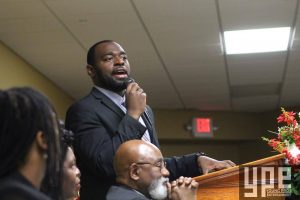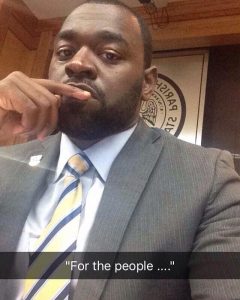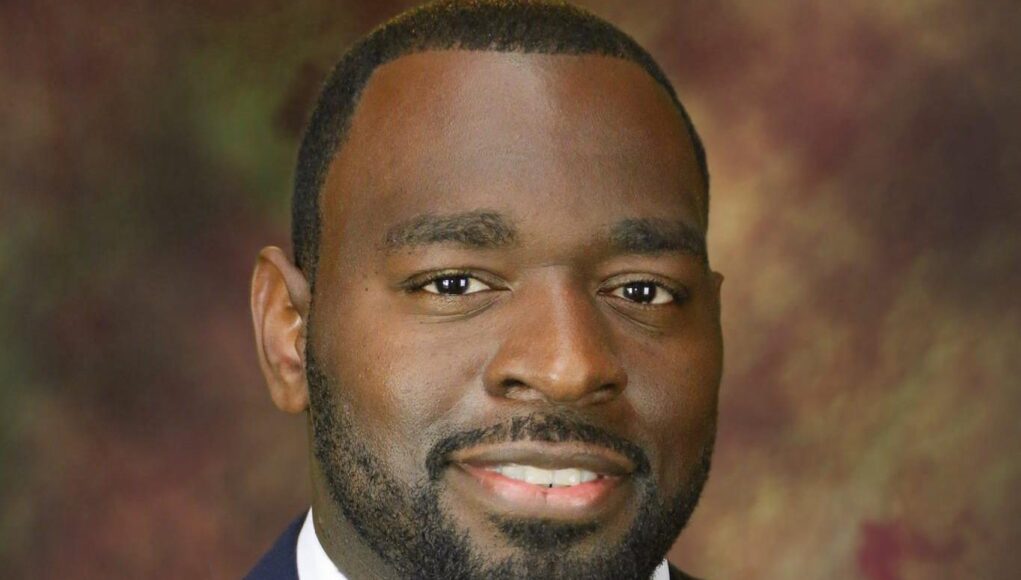This interview originally appeared in the printed edition of Heliopolis Magazine in September 2016.
Background: Steven Jackson is the Caddo Commissioner for District 3, which largely consists of Downtown Shreveport and the Shreveport Riverfront. It also includes Allendale and parts of the industrial section of north Shreveport. He is a graduate of Grambling State University and earned a masters of Liberal Arts at LSU-S in 2012.
Why did you advocate so strongly for the Caddo Common Park?
SJ: I was over in Plano, TX visiting one weekend and had a chance to go over to the Klyde Warren Park. When I got there, there were food trucks and people with tents having a mini-festival at night. They were setting up for a movie in the park. This was all attached to the downtown area. As you try to redevelop and revitalize Downtown’s West Edge, Ledbetter Heights, and Allendale, you have to have an anchor and you’ve got to have something for people to do. Caddo Common is a unique thing. It’s an investment. It’s a bold investment, but I think it’s something that needs to be done.
If you move from West Edge and Caddo Common to Downtown, what do you say to people who claim there are still no grocery stores or basic amenities?
SJ: I think before we talk about downtown we need to talk about what’s west of downtown.
Are you deflecting me, or are you not answering my question?
SJ: I’m getting to it. When you look at downtown you have to consider that a lot of people write off what’s west of downtown and the reality is that when Allendale was thriving, downtown was thriving. You can ignore history, but you can’t erase it. Facts are facts. Until we fix that problem, no grocery store, no market is going to open where there is no foot traffic. For us to think that people are just going to start popping up – and there are some great things going on in downtown: the Lofts, the residential, the business in downtown; we are doing what we need to do to have a vibrant downtown – you’ve got to have what’s called walking wallets. Individuals walking around who have money to spend.
We, the Heliopolis contributors, noticed, on the day of the bike plan adoption vote with the Commission, that there was some push back about the notion of who rides bikes. Where would one get the idea that biking is only for a certain race or class of people?

SJ: I don’t know where that comes from. I think it goes back to getting out of your comfort zone. Getting out of what you see every day. Getting out and visiting places and not just going and saying, “I went there,” but to actually immerse yourself and see what those communities do. When I visit a town, I don’t go to the tourist sections of town.
I ask the people at the [hotel’s] front desk, “where do the local people hang out?” because I want to see what they do. The tourists, we get in our car or our cab or our Uber, and we go where the concierge tells us to go. I want to go where the local people are hanging out, the dive bar.
What are your opinions on thoroughfare plans?
SJ: I think thoroughfare plans are great, but I’ll tell you there is one being developed here and I’m a little skeptical about where the funding is coming from, because the funding is coming from a certain sector. I know that when you pay for something, you have the ability to influence what it says as opposed to it being truly independent and reflective of what the community wants.
Do you have a guiding philosophy for your work in public service?
SJ: Keep the peoples’ interests first. When I say “the people” I don’t just mean the rich and powerful and the loudest, I mean everybody: the poor, the shy, everybody should have a voice, and I think that is one of the beauties of my district. I have Anderson Island which is a more settled, middle class neighborhood; Stoner Hill which is older, more retired; Highland which is transitional; Allendale which is historic; Downtown which is a commercial district, and North Highland which is an older, more established, wealthier area.
These areas are very diverse, there are voices on all sides, and some feel like they are totally left out. I remember first getting elected and someone from North Highland said “You know as long as the city does what they are supposed to do in North Highland, you’ll breeze through. It’s fine up here!”
What do you say about the idea that Parish money should be only spent in the rural parts of the parish and not in the city?
SJ: I disagree 150%. If you are a homeowner and you pay your taxes, the City of Shreveport gets a portion. Then you walk up to the Sheriff’s window and you pay a larger portion to the Parish. Even though it’s split, you’re in the Parish and to say we are not going to spend any money bothers me. There are some dedicated sales taxes that are committed to those who pay solely outside the city and I can understand that, but there are ways in which we can rededicate some stuff.
I think we need to look into that. Some folks are open to that so I believe you’ll start hearing some conversations about that pretty soon.
Do you think you are where you wanted to be on your progress report for your first year?

SJ: I would say yes and no. I’m disappointed that it seems we have created internal excuses about some of the more progressive things. The first thing that I had to get through – I spent the first part of the year telling folks that when I come with an idea, don’t try to talk me out of my idea. Let’s figure out how we can work together to have everybody happy. For the first couple of months I would come with an idea and the first thing they would say is, “Oh, we don’t do that.”
And so we’ve been able to accomplish some things, but I think there is a whole lot more to do with the Parish. The first year has been learning. We still have a lot to do. I was glad to get the park done. I was glad to get the reforms done. Now I’m working on some stuff relative to Allendale specifically: Choice Neighborhoods and tax abatements.
Is there a pet project you’d like to see break ground before the end of this first term?
SJ: What I’d really like to see us do is increase the summer recreation activities in some of our urban neighborhoods a lot of the neighborhoods don’t have swimming pools. I know there’s the alleged study saying that the pools were under utilized, but you have to teach the children to swim. That’s why they were under utilized – the kids didn’t know how to swim, and now you’ve got a program that’s teaching kids how to swim. Then you realize there is no public swimming pool at all in North Shreveport. So all of those kids that have to figure out how to get to the Southern Hills SPAR to go swimming if you don’t have transportation. If you’re using public transit – I mean who is going to sit on the city bus in their swimming attire? It may sound minuscule to some folks, but when you have children with nothing to do for the summer it leads to mischievous activity.
Did you come to the table already knowing a lot of stuff? You had experience working in the executive branch of city government in the mayor’s office.
SJ: Yes, and it kind of helps and kind of hurts, because the city is heavy on the administrative side and the Commission, ideally, is supposed to be heavy on the legislative side. One of the great things about Mayor Glover was he didn’t just sit you down in a room and say, ‘Be young so I can tell folks I have young people on my staff,’ he really let you immerse yourself into these projects and the things that were going on. So I got a first-hand look at these processes, so I know when someone is BS-ing.
So, you’re saying you had a mentor that saw that young people with potential need to be groomed?
SJ: Yes! Because, a lot of times, I go to these meetings and I’m the youngest person there by 30 to 40 years. They are sitting around the table making policy that is going to affect us for the next 20 years.
When I was in DFW recently, I realized the difference between that metroplex and the Ark-La-Tex is the difference between corporate wealth and generational wealth. Corporate wealth understands that you have to change. You have to be progressive. Generational says if it changes too much, I may lose my seat at the table, so let’s leave it alone.
Is there anything you want our readers to know about you and the future of this community?
SJ: As young folks, we have to start asking questions. For example, the issue of I-49. Which route do we choose? I think we’ve been fairly silent on it. Do you understand that the decision that’s going to be made, whether you are for or against a certain route, and I’m not advocating for one position or the other, but I do think that we’ve been silent or followed the loudest voices in the room, rather than trying to dissect the issue and get information.


